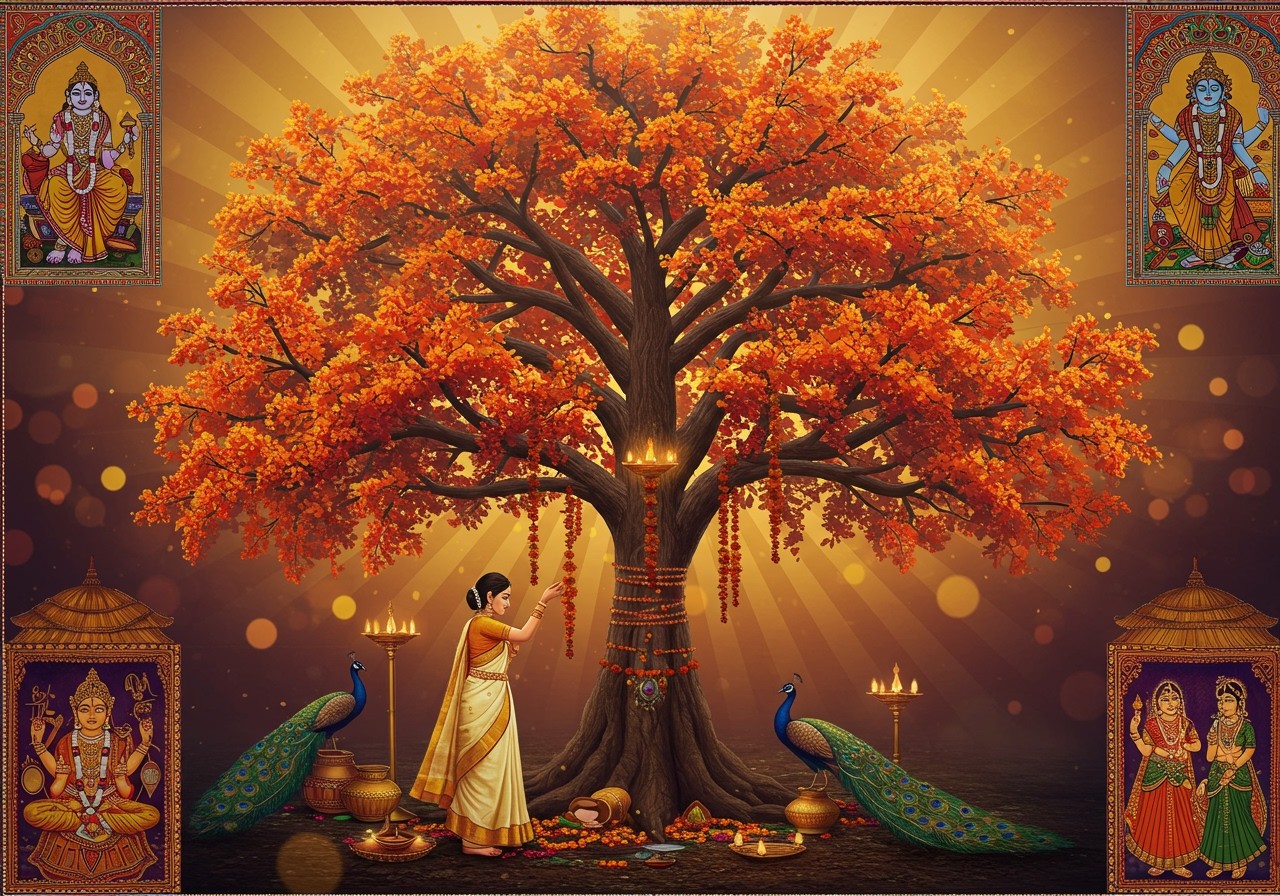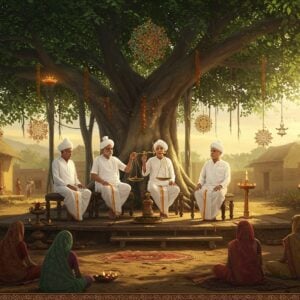
Namaste, dear readers! In the heart of Bharat’s rich cultural heritage, the Ashoka Tree, scientifically known as Saraca asoca, stands tall as a beacon of beauty and profound symbolism. Its vibrant presence graces our mythology, traditions, and even our modern lives in 2025, reminding us of the enduring power of nature and its connection to our spiritual well-being. For those who cherish tradition and seek authentic connections to our past, the Ashoka Tree offers a timeless link to India’s rich tapestry of stories and beliefs.
A Journey Through Time: The Historical Significance of the Ashoka Tree
The Ashoka Tree’s story unfolds across centuries, woven into the fabric of ancient India. From the epic verses of the Ramayana and the insightful narratives of the Buddhist Jataka tales, the Ashoka Tree emerges as a symbol of peace and prosperity. During the illustrious Maurya Dynasty, it held a place of honor, its vibrant orange-red blossoms signifying a flourishing reign. Imagine the royal gardens and monastic settings adorned with these magnificent trees, a testament to love, devotion, and the timeless beauty of nature.
Unveiling the Symbolism: A Tree of Many Meanings
The Ashoka Tree embodies a wealth of symbolic meanings, resonating deeply within Indian culture. It speaks to us of love, compassion, and the very essence of feminine beauty. In literature and poetry, it’s often portrayed as a symbol of solace and the alleviation of sorrow, a true embodiment of its Sanskrit name, “Ashoka,” meaning “without sorrow.”
- Hinduism: In Hindu tradition, the Ashoka Tree is associated with Kama Deva, the deity of love, symbolizing beauty, compassion, and relief from sorrow. Its fragrant flowers are said to be part of Kama Deva’s quiver, representing his captivating powers. Revered during the Chaitra month, the Ashoka Tree is also linked to the Yakshi mythological beings and often found near temples, adding to its sacred aura. The bark of the tree holds medicinal value and is sometimes used as a traditional remedy for reproductive health issues.
- Buddhism: For Buddhists, the Ashoka Tree embodies peace and the serene presence of the Buddha himself. It’s deeply connected to the birth of the Bodhisattva, with the belief that Gautama Siddhartha, the founder of Buddhism, was born under its shade. It stands as a reminder of enlightenment and the path to spiritual awakening.
- Jainism: Within Jainism, the Ashoka Tree represents peace, sanctity, and deep contemplation. It’s often seen as a place for spiritual gatherings, meditation, and the presence of the divine. Its symbolism extends to joy, purity, and finding refuge in the journey of self-discovery and spiritual growth.
Beyond these specific traditions, the Ashoka Tree’s message of love and compassion resonates universally, speaking to the shared human desire for peace and well-being. It truly embodies the spirit of “Vasudhaiva Kutumbakam,” the world is one family.
Ashoka Tree by Any Other Name: Regional Variations Across India
Across the diverse landscape of India, the Ashoka Tree is known by various names, reflecting its deep integration into regional cultures. In Hindi, it retains its Sanskrit-derived name “Ashoka,” carrying the beautiful meaning “without sorrow.” In Sanskrit, it’s also referred to as “Sita Ashoka,” linking it to the revered goddess Sita. These variations in names add to the richness and complexity of its cultural significance, demonstrating its widespread recognition and reverence.
The Ashoka Tree in the Modern Age: Relevance and Symbolism in 2025
Even in our modern era of 2025, the Ashoka Tree continues to hold relevance, adapting its symbolism to the challenges and opportunities of our time. As urbanization transforms our landscapes, it stands as a symbol of ecological balance and the urgent need for sustainability. It graces our urban gardens and green spaces, providing a much-needed connection to nature amidst the concrete jungle, whispering reminders of our cultural heritage amid rapid development. In the digital age, the Ashoka Tree finds a new home online, readily accessible as both a ritual item and a potent cultural symbol, bridging the gap between tradition and modernity.
Ashoka in Art and Literature: A Timeless Muse
The Ashoka Tree has long been a source of inspiration for artists and writers, its image and symbolism woven into the very fabric of Indian expression. In Hindi literature, it frequently appears in poetry, prose, and traditional folklore, adding depth and emotional resonance to countless narratives. Whether in classical or contemporary art forms, the Ashoka Tree symbolizes grace, beauty, and the enduring power of nature, its presence enriching our cultural landscape and inspiring creative minds across generations.
Looking for authentic Ashoka products to incorporate into your rituals and ceremonies? Poojn.in offers a curated selection to enhance your spiritual practices.
Poojn.in: Your Source for Authentic Ashoka Products
At Poojn.in, we understand the importance of using genuine ingredients in your puja. That’s why we offer 100% pure Ashoka chal (bark), ethically sourced and carefully packaged, to ensure the purity and sanctity of your rituals. Whether you need it for traditional remedies, or offerings, we have you covered.
- Various Quantities: Available in 100g, 250g, and 1kg packs to suit your specific needs. No matter the size of the puja, we have the right quantity for you.
- Affordable Pricing: Our Ashoka chal is priced competitively, ranging from ₹20.00 to ₹369.00, making authentic ingredients accessible to everyone.
Why choose Poojn.in?
- Guaranteed Authenticity: We ensure the purity and quality of our Ashoka products, providing you with only the most genuine ingredients. Source with confidence, knowing you’re receiving the best.
- Convenient Sizes: From smaller quantities for personal use to larger packs for elaborate ceremonies, we offer various sizes to fit your exact requirements.
- Pan-India Delivery: No matter where you are in India, we’ll deliver the Ashoka chal right to your doorstep, making it convenient for you to observe your traditions.
- Expert Guidance: If you have any questions about our products or need help choosing the right one, our knowledgeable team is always ready to assist you. We’re committed to supporting your spiritual journey.
Order your Ashoka chal today!
- Online: www.poojn.in (Shop from the comfort of your home.)
- Call: 03369029784 (Speak to our helpful customer service team.)
- WhatsApp: 9476142738 (Message us for quick assistance.)
Complement your puja with other essential items from Poojn.in:
- Complete puja samagri kits (Everything you need for a fulfilling ceremony.)
- Traditional holy utensils (Enhance the sanctity of your rituals.)
- Ayurvedic herbs (Jaribooti) (Explore the healing power of nature.)
- Ritual decoratives (Create a sacred atmosphere.)
Concluding Thoughts: The Enduring Legacy of the Ashoka Tree
The Ashoka Tree, or Saraca asoca, remains a vibrant symbol of India’s rich cultural heritage. It embodies love, peace, and the strength to overcome sorrow, connecting us to the wisdom of our ancestors. In the face of modern challenges, it stands as a beacon of hope, reminding us of the importance of ecological balance and sustainability. Its timeless presence inspires us to cherish our traditions while adapting to the changing times, ensuring that the legacy of the Ashoka Tree continues to flourish for generations to come.
Frequently Asked Questions About the Ashoka Tree
Is there anything else you’d like to know about the Ashoka Tree? Here are a few common questions we often hear:
What are some common names for the Ashoka Tree in India? The Ashoka Tree is known by several names throughout India, including “Ashoka” in Hindi, and “Sita Ashoka” in Sanskrit. These names reflect its significance in various regional traditions.
What makes the Ashoka Tree culturally significant? The Ashoka Tree’s cultural importance stems from its prominent role in Indian mythology, religious rituals, and its association with love, fertility, and overcoming sorrow.
How is the Ashoka Tree used in traditional practices? Traditionally, the bark and flowers of the Ashoka Tree have been used in Ayurvedic medicine for their potential health benefits, especially in addressing women’s health concerns.
What does the Ashoka Tree symbolize in Indian culture? In Indian culture, the Ashoka Tree symbolizes a range of positive qualities, including strength, beauty, love, hope, and renewal. It’s often depicted in ancient art and literature as a symbol of auspiciousness and well-being.
Are there any modern uses of the Ashoka Tree? Yes, even today, the Ashoka Tree plays a role in modern practices, particularly in herbal and Ayurvedic products. Its extracts are valued for their potential health-promoting properties.
What conservation efforts are being made for the Ashoka Tree in 2025? With increasing awareness of environmental issues, conservation initiatives in 2025 are focused on protecting the Ashoka Tree’s natural habitats, which face threats from deforestation and urbanization. These efforts aim to ensure the long-term survival of this valuable tree.


